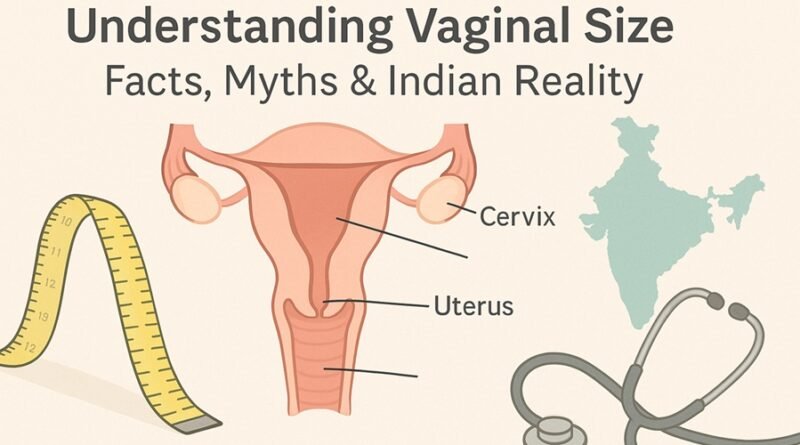Understanding Vagina Size: Length, Breadth, and the Indian Perspective
Introduction
The vagina is a central component of the female reproductive system, yet it is often misunderstood or surrounded by taboo—particularly in conservative societies like India. There is a need to talk openly and factually about vaginal size, function, and health, to dispel myths and foster body positivity.
This article aims to inform readers about average vaginal dimensions, variations, sexual implications, cultural attitudes in India, and the importance of medical and mental well-being.
Read This: Penis Length and Breadth: An Indian Perspective
What Is the Vagina?
The vagina is a muscular, elastic canal that connects the external genitalia (vulva) to the cervix (opening to the uterus). It plays key roles in:
- Menstruation
- Sexual intercourse
- Childbirth
It is self-cleaning, naturally lubricated, and varies in size, shape, and elasticity.
Average Vaginal Size (Length and Breadth)
Research, including data from gynecological and radiological studies, has provided approximate ranges:
📏 Length (Depth)
- At rest: 7 to 10 cm (2.7 to 4 inches)
- During arousal: Can expand up to 11 to 13 cm (4.3 to 5.1 inches)
➰ Width (Breadth/Girth)
- The vaginal canal is not uniform; it is wider in the middle and narrower at the opening and end.
- Average width during rest: ~2.5 to 3.5 cm (1 to 1.4 inches)
- It can expand significantly during arousal and childbirth.
👉 The vagina is highly elastic, designed to accommodate penetration, menstruation, and even childbirth. It adapts and returns to normal shape.
Do Indian Women Have a Different Average Size?
No extensive, country-specific study exists solely for Indian women, but Indian gynecologists report that vaginal dimensions fall well within global ranges. Ethnic or racial differences may slightly influence pelvic size, but they do not impact health or functionality.
Factors Influencing Vaginal Size
- Genetics
- Age and hormonal changes
- Childbirth and parity
- Body structure and fitness
- Menopause (can cause shrinkage and dryness)
Cultural Taboos and Myths in India
🔍 Common Myths
- Myth 1: Bigger is better — Not true. Comfort and compatibility matter more.
- Myth 2: Frequent sex “loosens” the vagina — False. Muscles stretch and return to shape naturally.
- Myth 3: Tightness indicates virginity — A harmful and medically inaccurate notion.
- Myth 4: You can tell sexual activity by vaginal size — Completely untrue.
🧠 Impact on Mental Health
Due to limited sexual education, many Indian women grow up:
- Unaware of their anatomy
- Ashamed of natural functions
- Afraid to seek medical help
This leads to issues like low self-esteem, fear during sex, or avoidance of gynecological care.
Sexual Compatibility and Vagina Size
The vagina adapts to various sizes due to its muscular and expandable design. Factors more important than physical size include:
- Communication
- Comfort
- Lubrication
- Mutual consent
- Emotional intimacy
Size mismatches are rare, and when discomfort occurs, it is often due to psychological stress, inadequate arousal, or medical conditions (like vaginismus or infections).
Medical Concerns Related to Vaginal Size
While size variations are normal, seek medical advice if you experience:
- Pain during intercourse
- Tightness or dryness after menopause
- Difficulty using tampons
- Discomfort after childbirth
Treatment may include pelvic floor exercises, lubricants, hormone therapy, or counseling.
Hymen and Virginity: Breaking the Myth
The hymen is a thin tissue near the vaginal opening, often wrongly equated with virginity. In reality:
- It can tear from non-sexual activities (e.g., cycling, sports)
- Some women are born with little or no hymenal tissue
- Its condition does not indicate sexual history
This myth has led to gender-based discrimination, forced “tests,” and emotional trauma for women in some parts of India.
Vaginal Rejuvenation and Tightening: Should You Consider It?
In India, there is a growing market for:
- Laser tightening
- Surgery (vaginoplasty)
- Herbal products
⚠️ Most of these are medically unnecessary unless prescribed for serious pelvic floor issues post-delivery or menopause. Always consult a licensed gynecologist before undergoing any procedure.
Educating Indian Women About Vaginal Health
✅ What Needs to Be Promoted:
- Sexual education in schools
- Pelvic health awareness
- Acceptance of bodily diversity
- Open conversation with doctors and partners
🧘♀️ Practices That Help:
- Kegel exercises for strength and control
- Good hygiene (no douching needed!)
- Wearing breathable cotton underwear
- Balanced diet and hydration
Vaginal Dimensions: Key Points Table
| Attribute | At Rest | During Arousal |
|---|---|---|
| Length (depth) | 7 – 10 cm | 11 – 13 cm |
| Width (girth) | ~2.5 – 3.5 cm | Expands significantly |
| Elasticity | High | Adapts to penetration |
Conclusion
The size of the vagina—like all body parts—varies naturally from person to person. In the Indian context, it’s critical to break away from shame, myths, and unrealistic expectations and embrace scientific, compassionate understanding of female anatomy.
Sexual and reproductive health education should empower Indian women to feel confident in their bodies, seek medical help without hesitation, and prioritize their well-being without fear or guilt.

